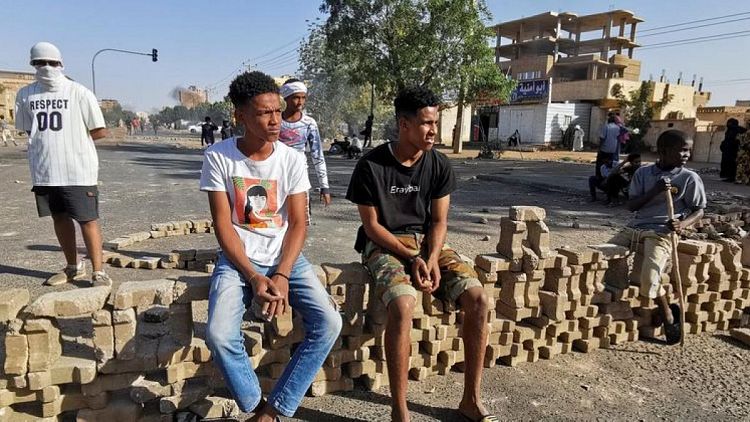By Nafisa Eltahir
KHARTOUM - Ahmed Ismat has a tear gas canister wound across his cheek. Aya no longer sleeps at her home to avoid arrest.
A coup in Sudan on Oct. 25 has propelled these young people and other members of the "resistance committees" onto the front line of the struggle against military rule.
But as their stand-off with security forces continues, the committees are drafting a charter to try to harness their grassroots activism into a political movement with broad appeal to better achieve their goals.
Sudan's coup derailed a two-year transition towards elections that was rocky but had brought hopes of democracy after three decades of autocratic rule under Omar al-Bashir. It also dealt a blow to political parties weakened by infighting during the transition, when they shared power with the military.
In the coup's aftermath, the committees have organised demonstrations that have drawn hundreds of thousands in cities across Sudan, as well as smaller protests, barricades and strikes, defying communications blackouts and a security crackdown that medics say has left at least 79 dead.
Their efforts have focused on mobilising protesters and they reject negotiation with the military. That has led some to dismiss them as youthful idealists who, like protesters in other countries in the region, lack the political presence or cohesion to achieve their aims.
Without commenting directly on the committees, the military has said civilian groups in general should support national consensus and reconciliation.
The charter, expected in the next days, will outline core demands and a vision for the future, said Ismat, a spokesman for committees in the capital, Khartoum. It is also
intended to help mobilise a broader coalition of support.
Some hope the committees can help fill the void left by a weakened political elite that since Sudan's independence in 1956 has repeatedly swapped places with the military but only enjoyed brief periods in power.
In another sign of their growing political engagement, the committees have met U.S. diplomats and officials from the United Nations. U.S. Senator Chris Coons said on Tuesday he had nominated the committees and a group of medics aligned with the protest movement for the Nobel Peace Prize.
"The responsibility is fully on our shoulders, we have to steer the country to safe shores," said Azza Sorkatti, a 38-year-old committee member and mother of two from eastern Khartoum.
SOCIAL NETWORKS
The committees emerged three years ago, early in the uprising against Bashir, but founding members say they owe their structure to a lesson from earlier protests in 2013 which were quickly and violently crushed. Politicians and activists attributed their failure to a lack of grassroots organisation.
The 2019 uprising soon swelled with Sudanese youth who had seen their prospects of jobs or emigration recede as an economic crisis deepened in Bashir's last years in power.
The committees tapped into social networks built over the years in neighbourhood soccer matches, card games, and WhatsApp groups. They have been criticised for not including more women -- so female activists created a #JoinTheCommittee campaign.
"It's impossible to represent the full neighbourhood but we represent all the different sections: teenagers, university students, workers, doctors, engineers, mothers and fathers," said Sorkatti.
Politics in Sudan has long been dominated by a cosy Khartoum elite. The committees, while stronger in big cities than rural areas, set out to change that.
In the drafting of the charter, "for the first time, people who were never in politics get to share their vision for how the country should be run," said one committee member who requested anonymity because of the security crackdown.
The committees remain committed to a flat, leader-less structure which they see as more democratic and harder for security forces to target.
In a future transition, they say they would continue their efforts to rebuild local government and keep checks on democratic progress.
DANGERS
The committees complain that after Bashir's overthrow, political parties tried to marginalise them by limiting their role to handing out bread and cooking gas and restricting their seats in a parliament that was never formed.
If they could join forces with the parties, that could create a basis for more durable democratic politics, though only if they could avoid getting sucked into factional squabbles, said newspaper editor and political commentator Alhaj Warrag.
Asked if political parties would join the resistance committees' charter, former cabinet minister Khalid Omer Yousif said both should form a broad front against the coup. "It's better that they work in coordination, maintaining their own structures and strengths," he told Reuters.
For now, the committees face more immediate challenges in a campaign fraught with physical risk.
Ismat, a 24-year-old student, spoke to Reuters days after he says he was shot at close range with a tear gas canister that ripped through his left cheek. In December he was burned by a stun grenade across his side.
Aya, a 19-year-old about to go to university, has stopped sleeping at home due to near daily reports of committee member arrests. The committees have identified some of the 79 killed, often with gunshot wounds to the head, as their members.
The military and police have said that peaceful protests are allowed, that security forces have sometimes had to defend themselves, and that protest casualties are being investigated.
"Securing ourselves has become really important, you feel you are unsafe inside your house," Aya said.
